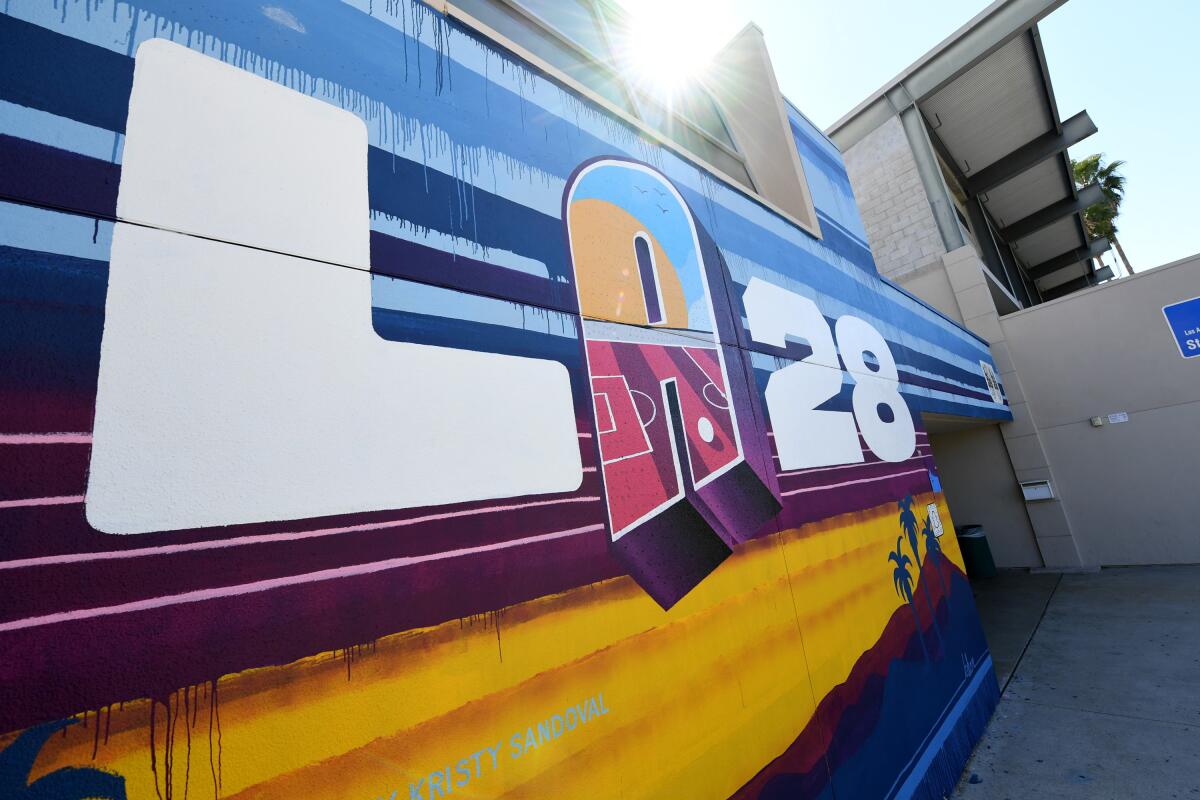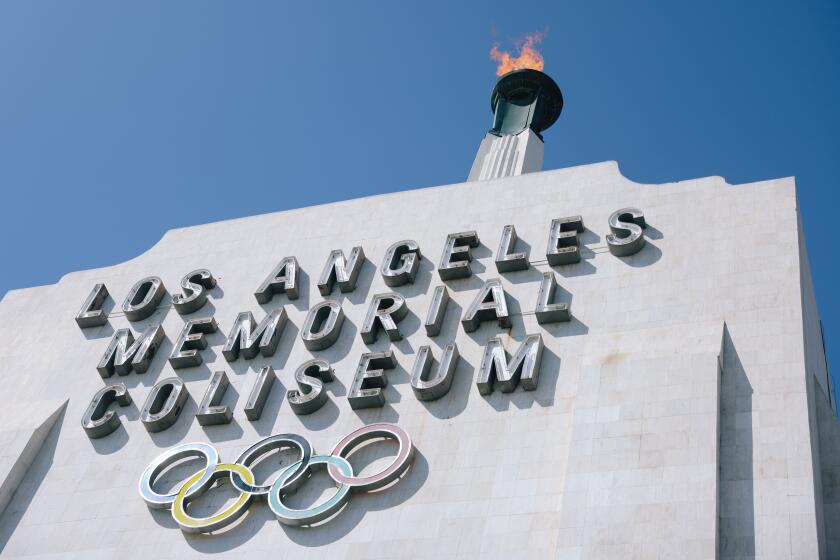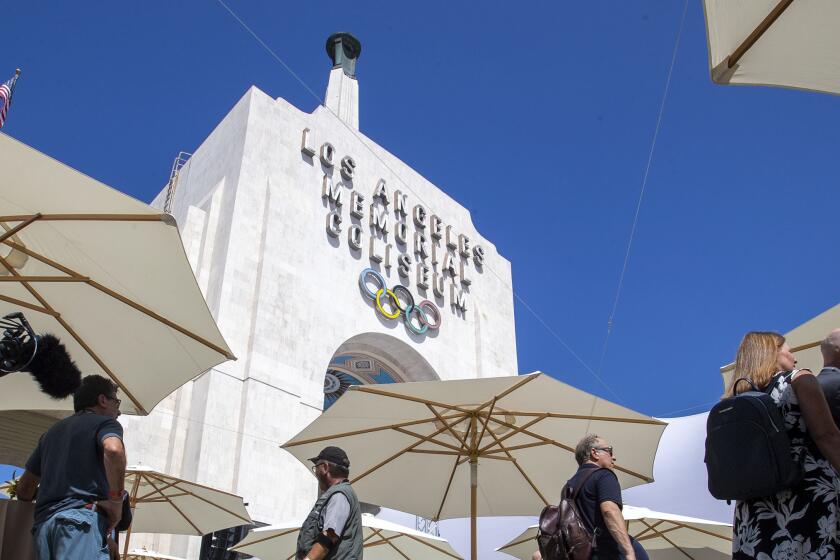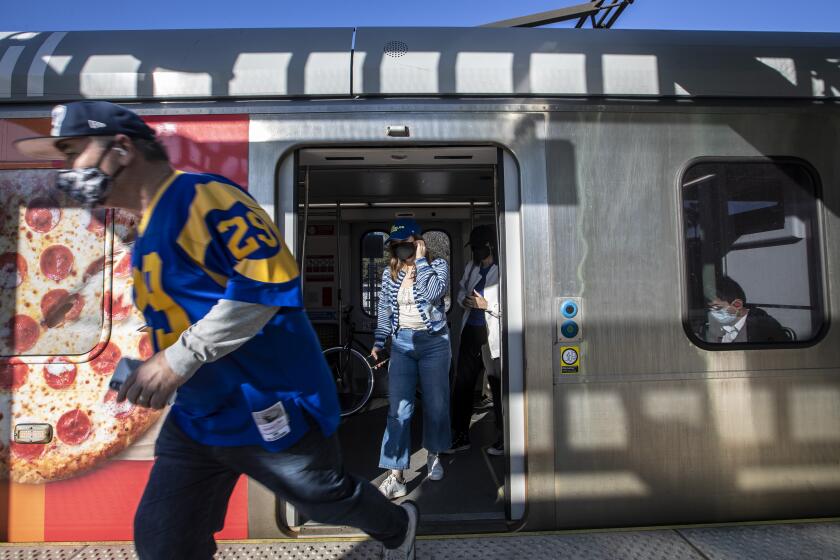Will the Olympic Games be as costly for L.A. as they are for Paris?

- Share via
Paris will celebrate the opening of the 2024 Summer Olympic Games a year from today, July 26, 2024. And four years later, in the summer of 2028, it will be Los Angeles’ turn to celebrate. If all goes well.
That’s a big if when it comes to the Olympics.
Back in 2017, when the International Olympic Committee simultaneously handed the 2024 and 2028 Summer Games to France and the U.S., IOC President Thomas Bach vowed that the scheme would be “a ‘win-win-win’ situation for the city of Paris, the city of Los Angeles and the IOC.” The committee made the double-allocation because fewer and fewer cities were putting themselves forward to host the Games.
Los Angeles’ roller coaster campaign to host the Olympics for a third time — an effort marked by early defeat and last-second negotiations — reached a conclusion Wednesday when the city was formally awarded the 2028 Summer Games.
Between 2013 and 2018, Olympic bids from more than a dozen cities were torpedoed by public pushback or political pressure. The lack of enthusiasm was fueled by the backstory of the Games: chronic overspending, intensified policing, accelerated gentrification and displacement in host cities, and corruption in everything from the bidding process to construction boondoggles.
Leaders in Los Angeles and Paris promised that their Summer Games would chart a new path. “We want the legacy to be different,” stated Tony Estanguet, president of the Paris 2024 Olympics, while L.A.’s Olympic bid assured the world that giving the nod to Los Angeles “refreshes the Olympic brand around the world.”
But the new path looks a lot like the old one. Just ask Paris.
Fifty-seven percent of L.A. residents believe the 2028 Olympics will be good for the city, according to a Suffolk University/Los Angeles Times poll. Younger Angelenos are more skeptical.
The Paris 2024 price tag has climbed from 6.8 billion euros to 8.5 billion euros, with some estimating that costs may rise as high as 10 billion euros — or more than $11 billion — by the time the Games commence.
To the chagrin of human-rights advocates, the French National Assembly used the security challenge posed by the Olympics to approve the experimental use of AI-driven video surveillance at the Paris Games. The law — supported by French President Emmanuel Macron but out of step with European Union regulations of AI technologies — will stay in place through March 2025, long after the Games conclude.
The Paris 2024 organizers tout the Games’ infrastructure projects as integral to the city’s long-term urban renewal efforts. Nonetheless, on deadlines aligned with the Olympics, residents and neighborhoods in the northern suburbs, home to immigrants and the working poor, are at risk for displacement and gentrification.
A tentative agreement between L.A. leaders and organizers of the 2028 Olympics details the issues facing the city as it prepares to host the Games.
As for scandals, last month, French investigators raided the Paris 2024 headquarters on as yet unspecified allegations of wrongdoing. Just weeks earlier, the president of France’s national Olympic Committee resigned suddenly, after reports of infighting in that organization.
And just as the French establishment sees the Paris Games as a potential public relations bonanza, so do those with a government grudge. For weeks this spring, demonstrators took to the streets objecting to Macron’s increasing the national retirement age. In March a French labor union cut power to two Olympic sites to protest the pension law, and in June, protesters briefly occupied the Paris 2024 headquarters. Labor discontents and controversies could boil over into disruptions magnified by the Olympic spotlight.
As for L.A., it’s too early to tell whether the city will match Paris in succumbing to the Games’ curses. But the terms of the agreement between the city and the IOC don’t bode well.
The Los Angeles City Council voted 11-2 to approve an agreement with LA 2028 to host the Olympics.
A lot of Angelenos remember the 1984 L.A. Games, when the Olympics actually ended with a surplus, the only Summer Games to do so in the last 60 years. Local politicians and voters changed the city charter to ensure that no L.A. taxpayer dollars would go to backstopping the Games.
LA28 ignored that lesson. Instead, the City Council and the state Legislature agreed to financially step up should any cost overruns accrue. Los Angeles is pledged to cover the first $270 million, and the state will cover the next $270 million. After that, the city is responsible for additional costs.
It’s a not inconsiderable commitment. Researchers at Oxford studying the Games from 1960 through 2016, estimated the cost overruns “at an average of 172 percent in real terms, the highest overrun on record for any type of megaproject,” such as highways and dams. Even the ’84 Games busted its initial budget.
Domestic sponsorships are meant to offset the city’s 2028 financial risks. Rick Burton, a former chief marketing officer for the U.S. Olympic Committee, was initially optimistic: “The sponsors are going to come back because it’s in the U.S. You can already feel the capitalistic lift.” But in a July report, the website Sportico noted that LA28 is “slightly behind compared to previous Olympic Games in terms of sponsor count, with only 35% of its $2.5 billion goal met.”
The proposed agreement between the city of Los Angeles and the LA28 organizing committee.
The estimated cost of the Los Angeles 2028 Games has already risen from $5.3 billion at the time of the bid to $6.9 billion today. That figure ignores the billions that the federal government is pouring into the Games or Games-adjacent projects — security costs, public transportation dollars and communications and environmental spending.
Some of this government spending would occur Games or not, but projects’ costs are rising to meet the Olympics’ deadlines. If Angelenos applaud fast-tracked public transit expansions, they should be leery of Olympics security “improvements.” The 1984 Games not only brought dollars and world-class athletes to L.A., it incentivized then-LAPD-Chief Daryl Gates’ disastrous militarization of the city police force.
California political leaders hope to leverage the 2028 Olympics to infuse billions of federal dollars into Los Angeles transit projects.
Former Mayor Eric Garcetti’s prediction in 2019 that the LA28 Games would generate a $1-billion profit was always laughable, untethered from recent Olympic history. The risk to California taxpayers was and is clear. Nonetheless, Mayor Karen Bass hasn’t backed away from supporting the Games.
Buckle up, Angelenos. The Olympic juggernaut is coming. Pay attention to Paris. When it comes to the Olympics, there is so much hindsight and so little foresight. The painful Parisian prologue may well foretell L.A.’s future.
Jules Boykoff, a former professional soccer player, is a political science professor at Pacific University in Oregon. He has written five books on the Olympics. Dave Zirin is the sports editor of the Nation.
More to Read
A cure for the common opinion
Get thought-provoking perspectives with our weekly newsletter.
You may occasionally receive promotional content from the Los Angeles Times.












